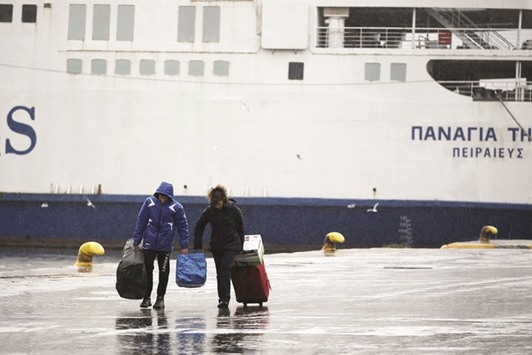Ferries remained docked at Greek ports and farmers poured milk onto the streets yesterday in protest over plans to revamp Greece’s pensions system, a condition for the country’s multi-billion-euro bailout.
In the northern town of Komotini, riot police fired tear gas at farmers trying to storm a regional briefing attended by Agriculture Minister Vangelis Apostolou.
“We want to go in to talk to this fool,” a protester was shown on local television telling police, before the clash broke out.
Lawyers, engineers and rail workers are also striking against the reform that aims to reduce spending on pensions which is the highest in the European Union.
Public anger is growing over the leftist-led government’s drive to cut its costly pension bill by some €1.8bn this year, the equivalent of about 1% of national output.
Public and private sector workers plan a national walkout on February 4 but ship workers took early action yesterday by starting a 48-hour strike that brought passenger shipping activity in the seafaring nation to an effective standstill.
“This is a first response to the third (bailout) maelstrom,” the Panhellenic Seafarers’ Federation said in a statement.
Under reform proposals, their own contributions fund will be merged with another, sparking concerns about lower pensions in future.
On the Aegean island of Naxos, where farming accounts for 50% of the local economy, farmers gathered at its port to pour away milk.
In the city of Thessaloniki in northern Greece, farmers gathered with tractors to protest.
“The government is planning to double our taxation ... and triple our pension contributions. This is unacceptable, they will exterminate us”, said Vagelis Boutas, president of a national committee co-ordinating the farmer protests.
“We will escalate our demonstrations from tomorrow,” he told Reuters.
Debt-ridden Greece has made many failed efforts in the past decades to revamp its ailing pension system, the most expensive in Europe as a percentage of economic output.
Experts have in the past warned it will collapse if left unchanged.
Pension reform is a particularly sensitive issue for the Tsipras government, engaged in a delicate balancing act to push through controversial reforms in a fractious parliament where it has a slim majority of just three seats.
Athens signed up to a bailout deal with international lenders last year worth up to €86bn, yanking the country from the brink of financial meltdown.
It has presented a plan which increases social security contributions and recalculates future pensions but has also promised to protect pensioners on whom entire households can sometimes depend.
After tough negotiations and months of resistance to demands by lenders, Prime Minister Alexis Tsipras agreed last year to implement a 2010 law that included discouraging early pensions and raising the retirement age.

Passengers carry their luggage under heavy rain as passenger ships are moored during a 48-hour strike by Greek ship workers against planned pension reforms at the port of Piraeus, near Athens.
